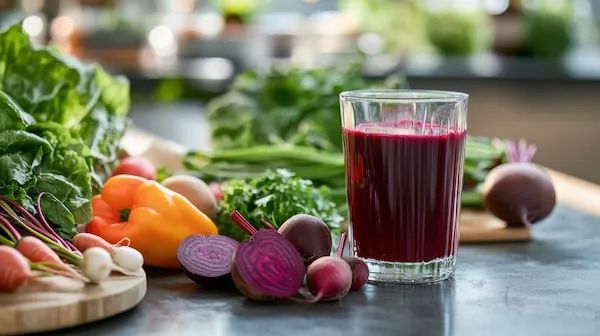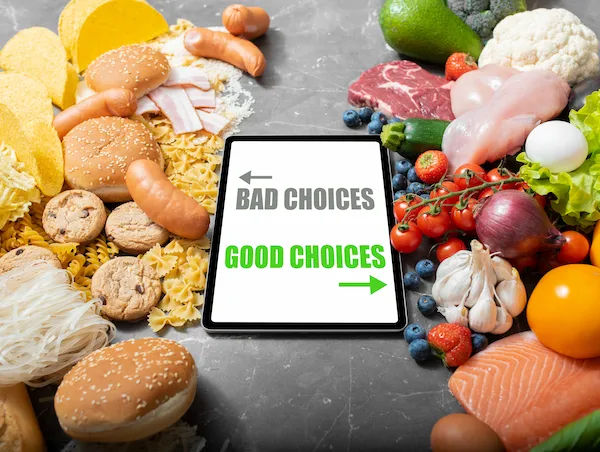Guide to Women Health Nutrition
Discover essential nutrition tips for women’s health. Learn how balanced diets, key vitamins, and lifestyle choices support energy, hormonal balance, and long-term wellness.

Written by Dr. Shaik Abdul Kalam
Reviewed by Dr. J T Hema Pratima MBBS, Fellowship in Diabetes Mellitus
Last updated on 13th Jan, 2026

Introduction
Navigating the world of health and wellness can feel overwhelming, especially for women whose nutritional needs are uniquely complex and change throughout life. From the energy demands of your 20s to the hormonal shifts of menopause, what you eat plays a pivotal role in how you feel every day. This comprehensive guide to women's health nutrition is designed to cut through the noise. We'll explore the essential nutrients your body craves, how to tailor your diet to your specific life stage, and provide practical, actionable strategies to build a sustainable and joyful relationship with food. Think of this not as a restrictive diet, but as an empowering toolkit to fuel your strength, support your mood, and build a foundation for lifelong vitality. Let's embark on this journey to discover how the right nutrition can transform your health.
Essential Nutrients Every Woman Needs to Know
A woman's body has specific, high demands for certain vitamins and minerals. Understanding these key players is the first step to optimizing your health.
Iron: Combating Fatigue and Supporting Energy
Iron is fundamental for producing hemoglobin, which carries oxygen in your blood. Women are at a higher risk of iron deficiency due to menstrual blood loss. Symptoms of low iron (anemia) include fatigue, weakness, pale skin, and shortness of breath.
How to incorporate it:
There are two types of iron.
Heme iron, found in animal products like red meat, poultry, and fish, is more easily absorbed.
Non-heme iron is found in plant sources like lentils, spinach, beans, and fortified cereals. To enhance the absorption of non-heme iron, pair it with a source of Vitamin C, such as adding bell peppers to your spinach salad or squeezing lemon juice on your lentils.
Calcium and Vitamin D: The Dynamic Duo for Bone Health
Calcium is the primary building block of bones and teeth, while Vitamin D acts as the key that allows your body to absorb it. Women are more susceptible to osteoporosis later in life, making this duo non-negotiable.
How to incorporate them:
Dairy products like yogurt and milk are classic calcium sources, but don't overlook fortified plant milks, sardines, tofu, and dark leafy greens like kale. For Vitamin D, seek sensible sun exposure and include fatty fish (salmon, mackerel), egg yolks, and fortified foods in your diet. Due to widespread deficiency, a supplement is often recommended, especially in colder climates. Apollo24|7 offers a convenient home collection for tests like vitamin D to check your levels and guide supplementation.
Folate (Folic Acid): Crucial for All Ages
Folate is a B vitamin vital for cell growth and the formation of DNA. It's famously critical during early pregnancy to prevent neural tube defects in babies, but its importance doesn't end there. It supports heart health and energy production for all women.
How to incorporate it:
Load up on dark leafy greens (the word "folate" comes from "folium," the Latin word for leaf), asparagus, Brussels sprouts, citrus fruits, beans, and peas. Most grain products are also fortified with folic acid.
Magnesium: The Unsung Hero for Stress and Sleep
This mighty mineral is involved in over 300 biochemical reactions in your body. It helps regulate muscle and nerve function, blood sugar levels, and blood pressure. It's also crucial for synthesizing serotonin, a neurotransmitter that promotes relaxation and sleep.
How to incorporate it:
Find magnesium in nuts (especially almonds and cashews), seeds (pumpkin and chia), spinach, black beans, avocados, and whole grains. If you struggle with sleep or high stress, assessing your magnesium intake is a great first step.
Consult a Dietitian or Nutritionist for the best advice
Tailoring Your Diet to Your Life Stage
A one-size-fits-all approach doesn't work for women's health nutrition. Your body's needs evolve, and your diet should too.
Nutrition in Your 20s and 30s: Building a Strong Foundation
This is the time to build peak bone mass and establish healthy habits. Focus on:
Calcium & Vitamin D: Aim for the recommended daily intake to build strong bones for life.
Iron: Replenish iron stores lost during menstruation.
Protein: Supports muscle maintenance and sustained energy.
Whole Foods: Prioritise a balanced diet over fad diets to create sustainable patterns.
Preconception and Prenatal Nutrition: Eating for Two
Nutrition before and during pregnancy sets the stage for your baby's health.
Folate: This is the most critical nutrient. A supplement is almost always advised in addition to a folate-rich diet.
Iron & Calcium: Needs increase significantly to support the baby's growth and the mother's expanded blood volume.
Choline: Vital for brain development, found in eggs, meat, and cruciferous vegetables.
Professional Guidance is Key: Consult a doctor online with Apollo24|7 for personalised prenatal nutrition advice tailored to your health profile.
Nutrition During Perimenopause and Menopause: Navigating Change
As estrogen levels decline, women face new challenges like weight gain, hot flashes, and increased risk of heart disease and osteoporosis.
Phytoestrogens: Foods like soy, flaxseeds, and tempeh may help mildly modulate hormones and reduce hot flashes for some women.
Fiber: Helps manage weight and supports heart health.
Calcium & Vitamin D: Even more critical to slow bone density loss.
Reduce Triggers: Spicy foods, caffeine, and alcohol can exacerbate hot flashes for some.
Conclusion
Your journey with women's health nutrition is deeply personal and ongoing. It's not about perfection but about making consistent, informed choices that honor your body's changing needs. By understanding the essential nutrients, respecting your current life stage, and building a plate full of colorful, whole foods, you are investing in your long-term strength, vitality, and well-being. Remember, the goal is to feel energised and empowered from the inside out. Start by implementing one or two changes from this guide, and build from there. If you have underlying health conditions or specific concerns, such as persistent fatigue or digestive issues, consult a doctor online with Apollo24|7 for further evaluation and personalised advice. Your health is your greatest asset—nourish it well.
Consult a Dietitian or Nutritionist for the best advice
Consult a Dietitian or Nutritionist for the best advice

Ms. Sushma Jaiswal
Dietician
42 Years • M.Sc.(Food & Nutrition)
Bengaluru
Swasthya Nutrition, Bengaluru

Ms. Neelanjana J
Dietician
5 Years • Bsc., Msc. Nutrition and Dietetics specialised general weight management, PCOS/PCOD weight loss and Diabetes management. A clinical dietitian with 4+ year experience specializing in evidence-based, result-oriented nutrition therapy. I have extensive experience in weight loss, thyroid management, PCOD/PCOS, weight gain, and diabetes & prediabetes care. My approach is personalized, practical, and sustainable—focusing on helping individuals achieve long-term lifestyle change rather than quick fixes. I work closely with clients to understand their medical history, lifestyle, and goals, and then design customized diet plans that support hormonal balance, metabolic health, and overall wellbeing. My goal is to make nutrition simple, realistic, and effective—so you see measurable results and feel your healthiest self.Auther in Health benefits of jackfruit (Artocarpus heterophyllus Lam.) seeds: A review (2023) The Pharma Innovation Journal Co- Auther in Malnutrition in Women: A review (2023) The Pharma Innovation Journal. Highfield Level 3 in HACCP. Highfield Level 4 International Award in Food Safety Managment
Bengaluru
Apollo Clinic, JP nagar, Bengaluru

Ms. Suhita Sinha
Dietician
8 Years • BSC Food & Nutrition
Kolkata
Chikitsa Medicare Centre Pvt. Ltd.Sattelite Centre Behala Chowrasta, Kolkata

Ms. Soma Saha
clinical nutrition
17 Years • B.Sc. - Home Science (Food & Nutrition), M.Sc. - Home Science (Food & Nutrition)
Kolkata
Dr Utsa Basu Clinic, Kolkata
(50+ Patients)

Dr. Ramalinga Reddy
General Physician
5 Years • MBBS MD General medicine
Bengaluru
PRESTIGE SHANTHINIKETAN - SOCIETY CLINIC, Bengaluru
.webp)


